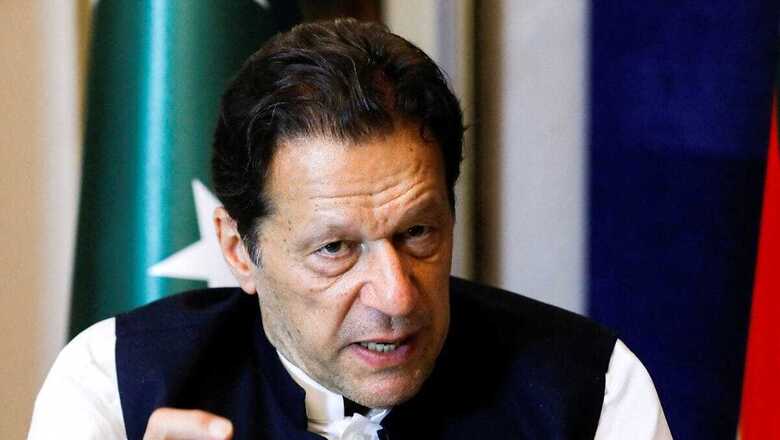
views
The turmoil in Pakistan is becoming a melodrama with all the ingredients for making a Netflix political thriller. A former PM removed from office through a no-confidence motion (in April 2022) accuses the then Army Chief (General Qamar Bajwa), who had manoeuvred to make him PM in the first place, of engineering his ouster. Add to that an international dimension with the accusation that the US wanted his exit for his pro-Russia and pro-China leanings. He also claims that his life is in danger and that he could be assassinated by the very same army-linked elements that made an aborted attempt on his life earlier (in November 2022).
The former PM denounces the Inter-Services Intelligence (ISI) (Major General Faisal Naseer) of orchestrating plans to murder him, which prompts the Army spokesperson to berate him for making “highly irresponsible and baseless” allegations for furthering his political objectives and calling them “deplorable and unacceptable”. Adept at theatrics, Imran Khan walks for a court appearance with aides fully surrounding him with bulletproof shields like the Roman legions in Asterix comics.
During a court appearance, he is whisked away for trial by a paramilitary squad at the behest of the National Accountability Bureau (NAB) headed by a Lt General, the same NAB that Imran Khan had used to hound out Nawaz Sharif and other political opponents. The Chief Justice of the Supreme Court, whose political sympathies for Imran Khan are open, orders his release. The sitting PM of Pakistan, Shehbaz Sharif, blasts with contempt the Chief Justice for favouring his “ladla”. He had earlier tried unsuccessfully to limit the power of the Supreme Court through the parliamentary route. The Chief Justice had ordered elections in Punjab in May, an order ignored by the Sharif government. The High Court has now ordered a short reprieve from arrest for Imran Khan but fearing that as soon as he walked out on bail he would be re-arrested by the authorities, closeted himself in the court for eleven hours till he was sure this would not happen. For the moment the street has quietened down, but the comedy-tragedy of many acts that is being staged has not ended either for the cast of characters involved or the audience.
Imran Khan’s arrest unleashed his street supporters to rattle the gates of the GHQ in Rawalpindi and set fire to the residence at Lahore of the Corps Commander without any attempt at prevention, raising speculation either about divisions in the Army or conspiracy theories about street excesses providing the authorities with a good reason to crack down hard. The Army Chief is accused by PTI supporters (Imran Khan’s party) of settling scores with the Corps Commander (possibly removed from post) and leaving Jinnah House, his residence, undefended. All said and done, the reputation of the Army, which is seen as the custodian of Pakistan’s ideology, unity, and security, seems to have been dented.
The current Army Chief General Munir, earlier the ISI chief whom Imran Khan divested of his past and who is a protégé of General Bajwa, is Imran Khan’s bête noire, as is General Bajwa himself. He continues to attack him personally and seek his resignation. Imran Khan, who believes in djinns and is married to a believer in occult practices, has taken head on the one force in Pakistan that when challenged cost previous Prime Ministers either their head or exile. It is almost inconceivable that a person who has so openly defied the Pakistan Army will be allowed to come to power, as once he does after worsting the Army in a no-holds-barred confrontation, he will become uncontrollable, the balance of power within the system will shift in favour of the civilian establishment, putting at risk the many fiefs the Army holds within the country’s system.
A view is being expressed, surprisingly echoed in tweets by Zalmay Khalilzad, the point man behind America’s Doha agreement, that General Munir has mishandled the situation, should resign, and that the solution lies in holding elections, which Imran Khan is expected to win hands down. What game elements like Khalilzad are playing is unclear, given the hands-off stand that the US and the UK have adopted on the political theatre being played out in Islamabad.
Any perspective of Imran Khan coming back to power would make it even more necessary for the Army and the PDM coalition in place to make sure he is convicted in any one of the over 100 cases against him and disqualified electorally as a result. The irony is that a man who made anti-corruption his selling political point has been charged with several cases of corruption, including making money from the sale of expensive gifts received from foreign dignitaries, something not consonant with his vision of creating Pakistan into a new Medina. He is the man who admired Osama bin Laden and supported the Taliban. No wonder his street supporters are full of radicalised youth. He is also the man who made vicious comments against Prime Minister Modi, the BJP and the RSS on the podium of the UN General Assembly.
These destructive political games are being played in the country’s capital when Pakistan is in deep distress economically. One-third of the country was flooded last year. Seeking and obtaining external help to cope with this natural calamity was projected as a huge diplomatic success by the Sharif government. Help from India next door was neither sought nor offered. India rushed to assist earthquake-stricken Turkey, with which Pakistan identifies in many ways, and which has become unfriendly to India under President Erdogan for Islamic reasons, and this the Turks welcomed. Despite the much-vaunted Chinese investments in Pakistan’s energy sector as part of the CPEC project, the country is facing a serious energy crisis. Food shortages have seen people rioting to get rations from relief trucks.
In April 2023, the consumer price index in Pakistan touched a record 36.4 percent. The Pakistan rupee has plummeted to Rs 295.65 to a US dollar. In April, Pakistan’s Central Bank’s foreign exchange reserves stood at a mere $4 billion, providing little more than one month of import cover. China has not been overly generous to bail out Pakistan. It approved a rollover of $1.3 billion, in addition to $700 million lent previously. An IMF bail-out loan to prevent a default has remained elusive so far. Pakistan has urged the IMF to release a tranche of $1.1 billion after the ninth review but has been asked to arrange the $6 billion required to meet the repayments by June-end 2023. Pakistan’s Arab friends have not been as supportive as before. Saudi Arabia has assured the IMF it will provide a $2 billion loan to Pakistan to avoid a default, with the UAE making a similar commitment for a $1 billion loan. Moody has downgraded Pakistan to its lowest-ever rating. With the present political turmoil, needed external financial relief and internal decisions necessary to build confidence abroad are unlikely to materialize.
Despite the internal mess in Pakistan that will endure for some time, the disconnect between its internal beleaguerment and its external posture towards India as expressed by Bilawal Bhutto Zardari at the SCO Foreign Ministers’ conference is striking. Bilawal waxed eloquent on regional connectivity, on connecting South Asia to the Middle East through Pakistan, on an economically integrated region, resorting to this empty posturing when it refuses to trade with India and denies it connectivity to Afghanistan and Central Asia. He took insidious digs at India on the Kashmir issue and terrorism, with references to self-determination, violation of UN resolutions, CPEC as a force multiplier for connectivity, weaponising terrorism for diplomatic point scoring, fascism, religious hate, economic chest-thumping when the region has the largest number of poor people, and so on, when Pakistan is struggling to keep its head above water. To the Pakistani press, he said that Pakistan will react to the decision to hold a G20 meeting in Kashmir in a manner that India will “remember”.
Some concerns are expressed about the spillover into India of instability in Pakistan. Some recent terrorist incidents in J&K would point in this direction. It is unlikely, though, that in the state Pakistan is in, its armed forces, directly or indirectly, would risk activating the border with India where the ceasefire is holding. We have, of course, to tighten our security grid in J&K to counter any stepped-up infiltration attempts. For the rest, let Pakistan, which considers India as its eternal enemy, deal with its own problems.
Kanwal Sibal is a former Indian Foreign Secretary. He was India’s Ambassador to Turkey, Egypt, France and Russia. The views expressed in this article are those of the author and do not represent the stand of this publication.



















Comments
0 comment